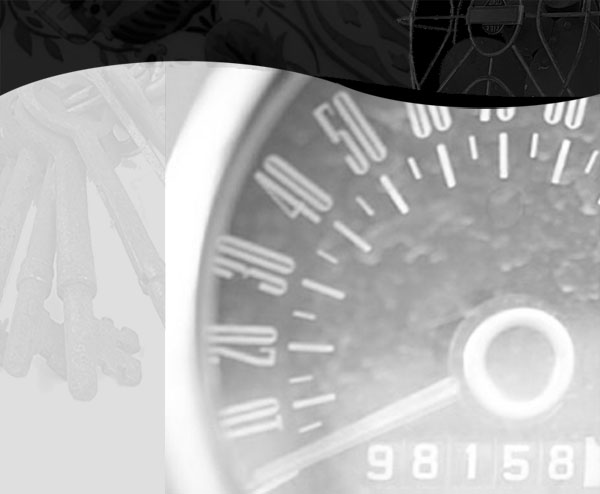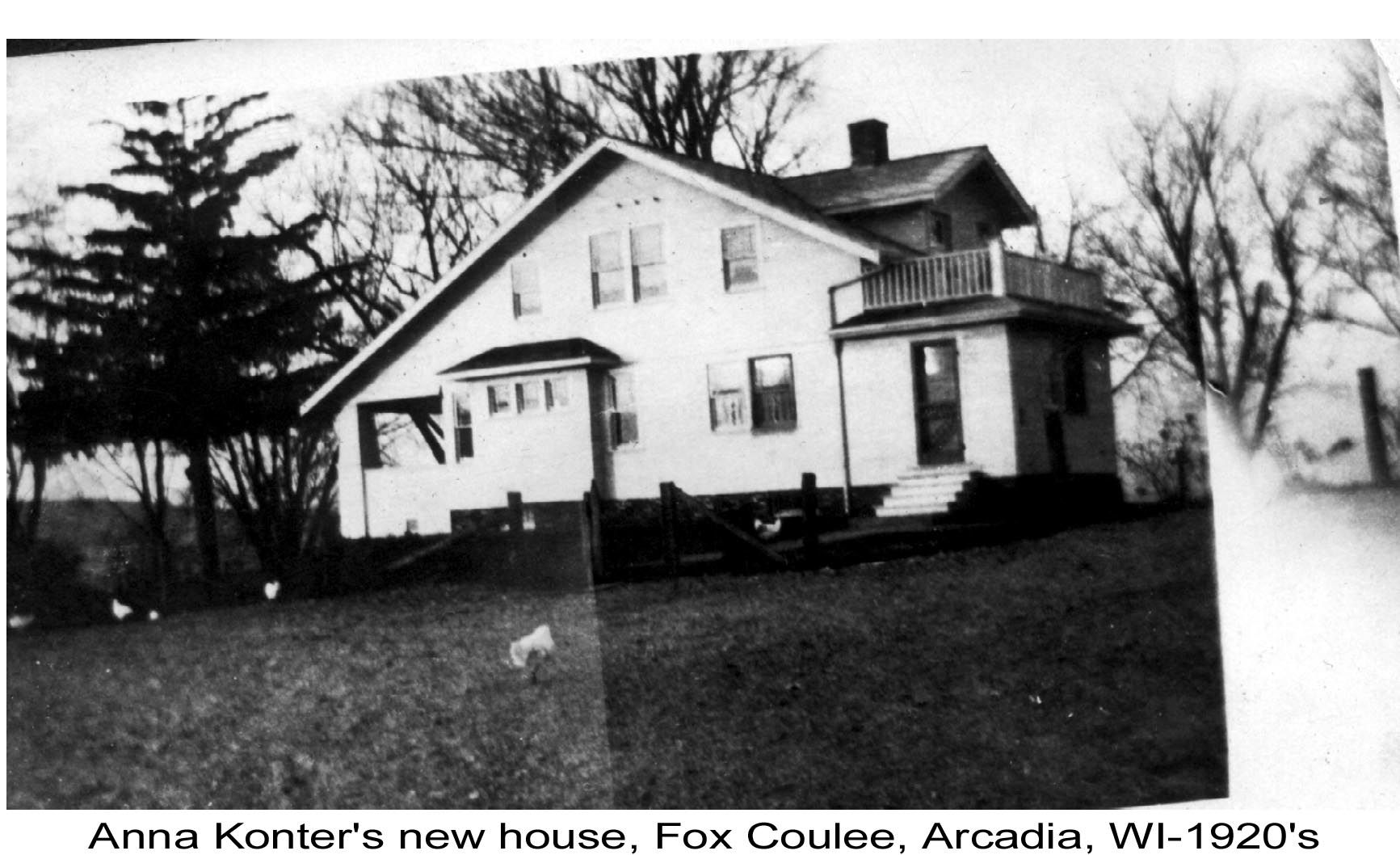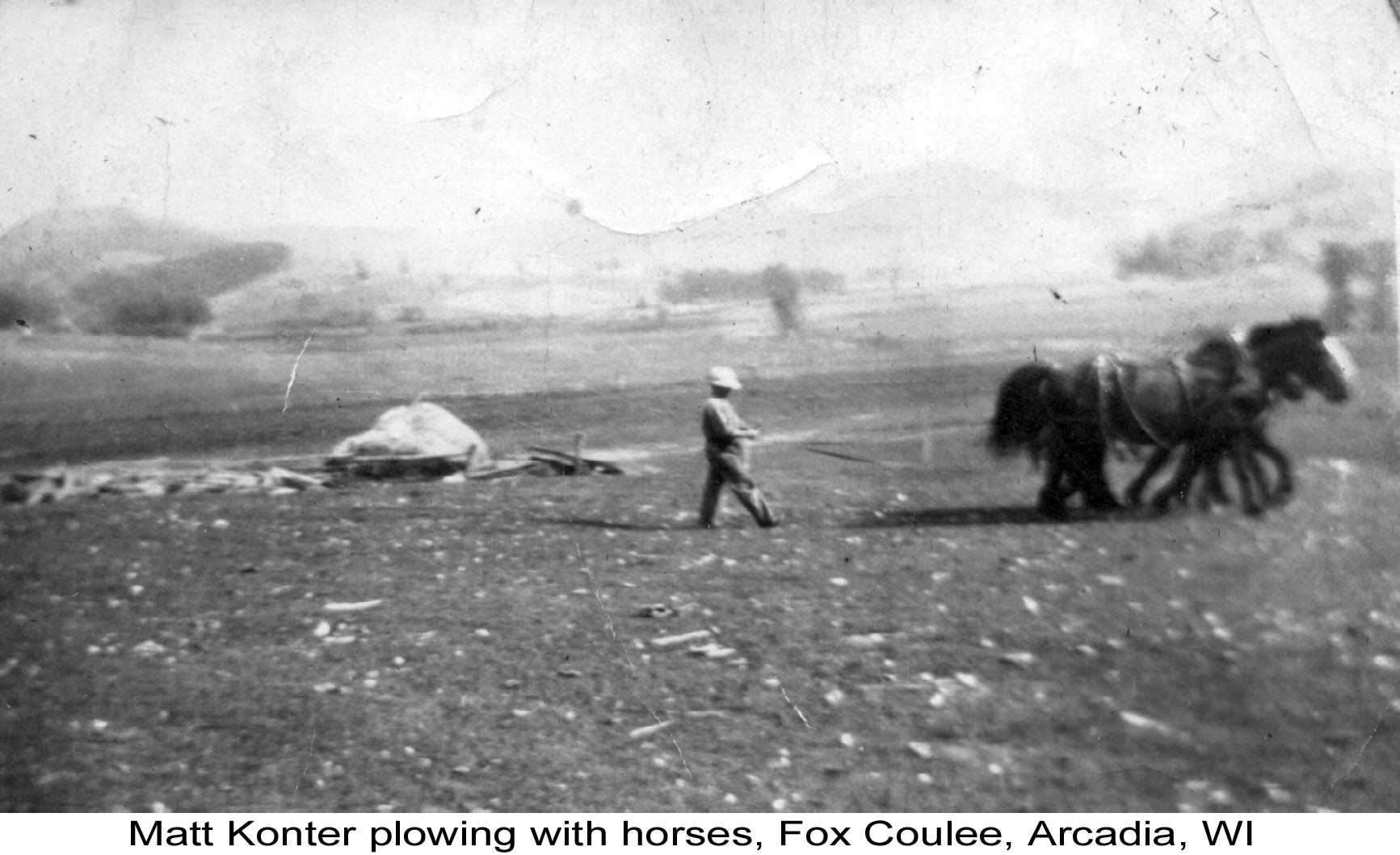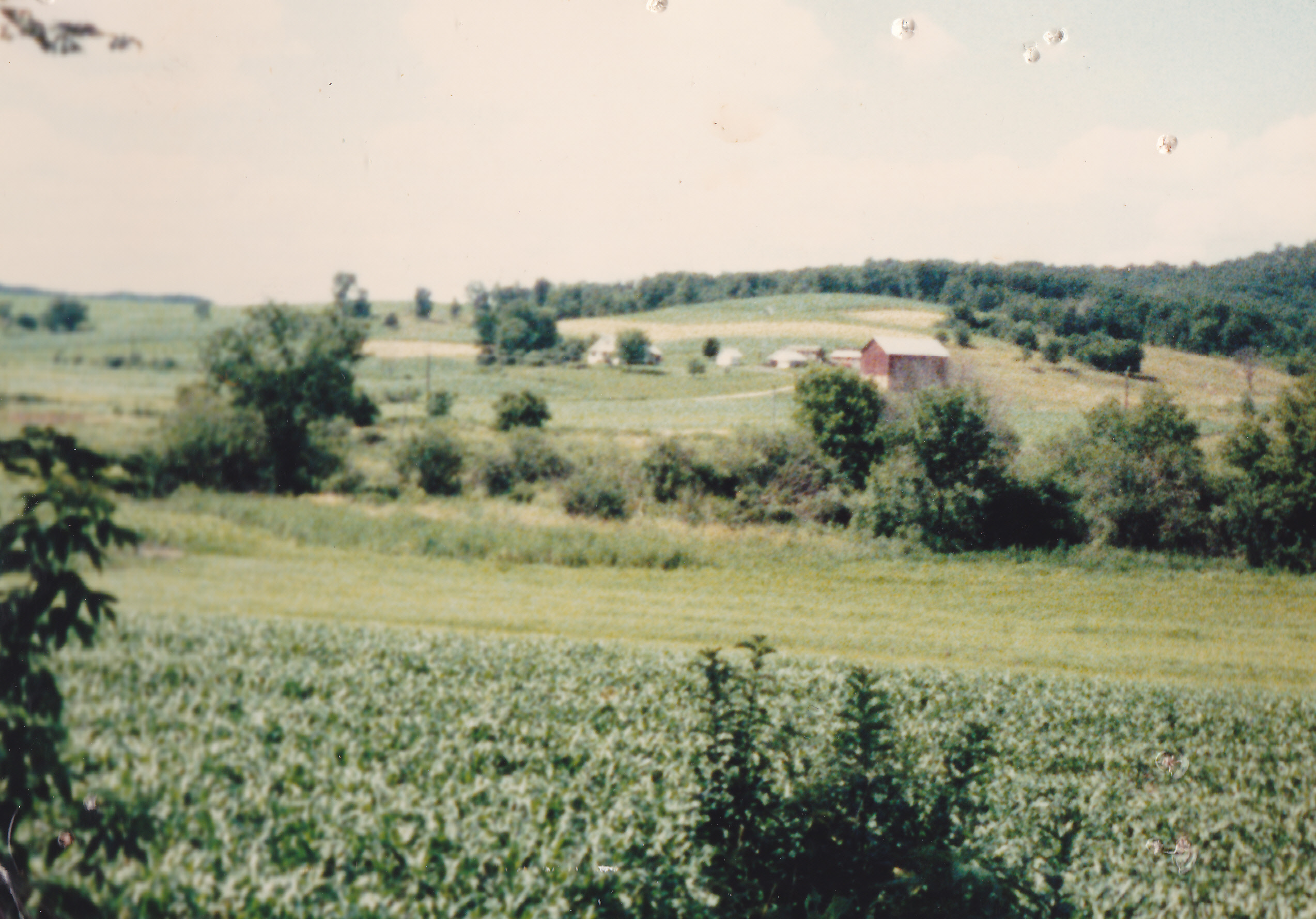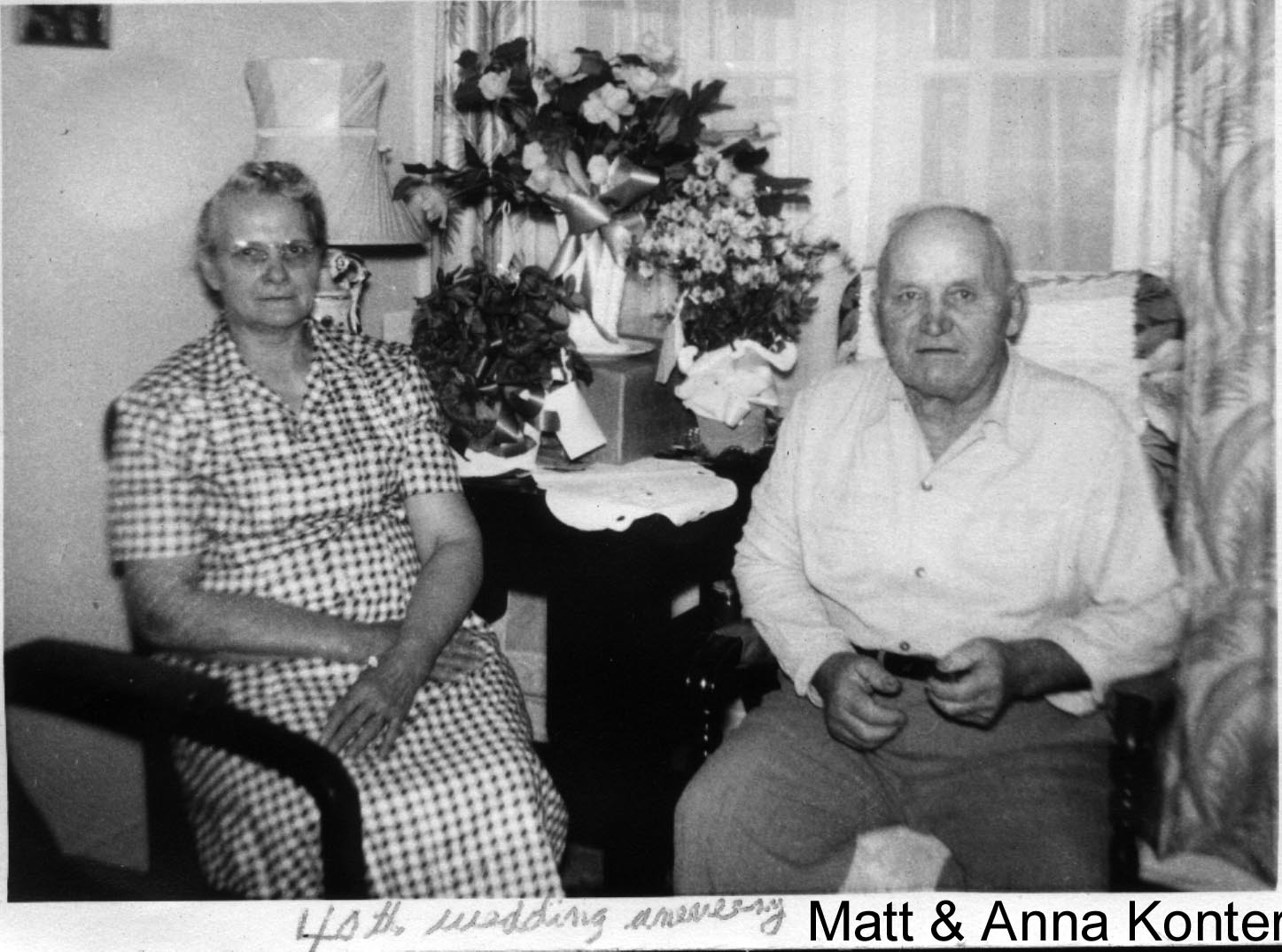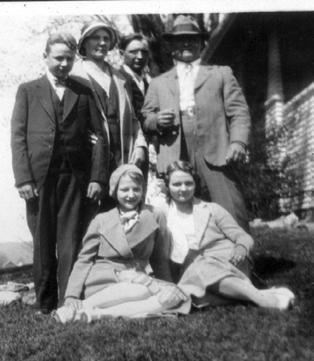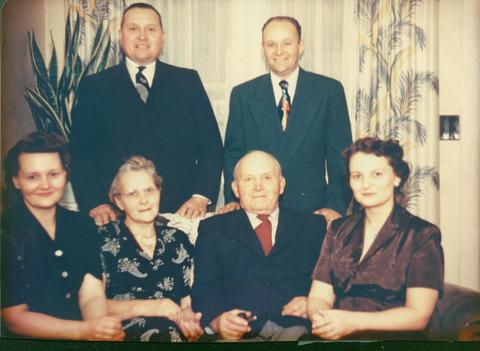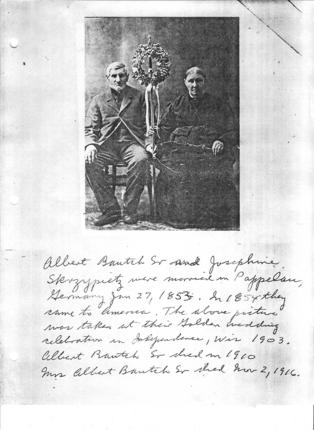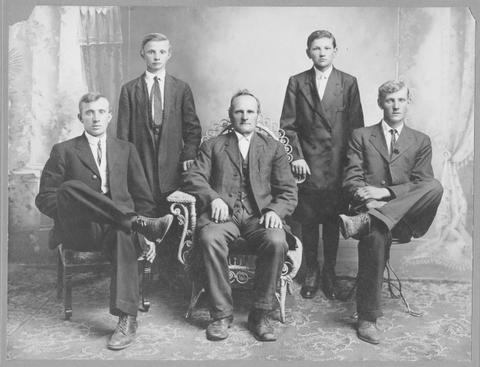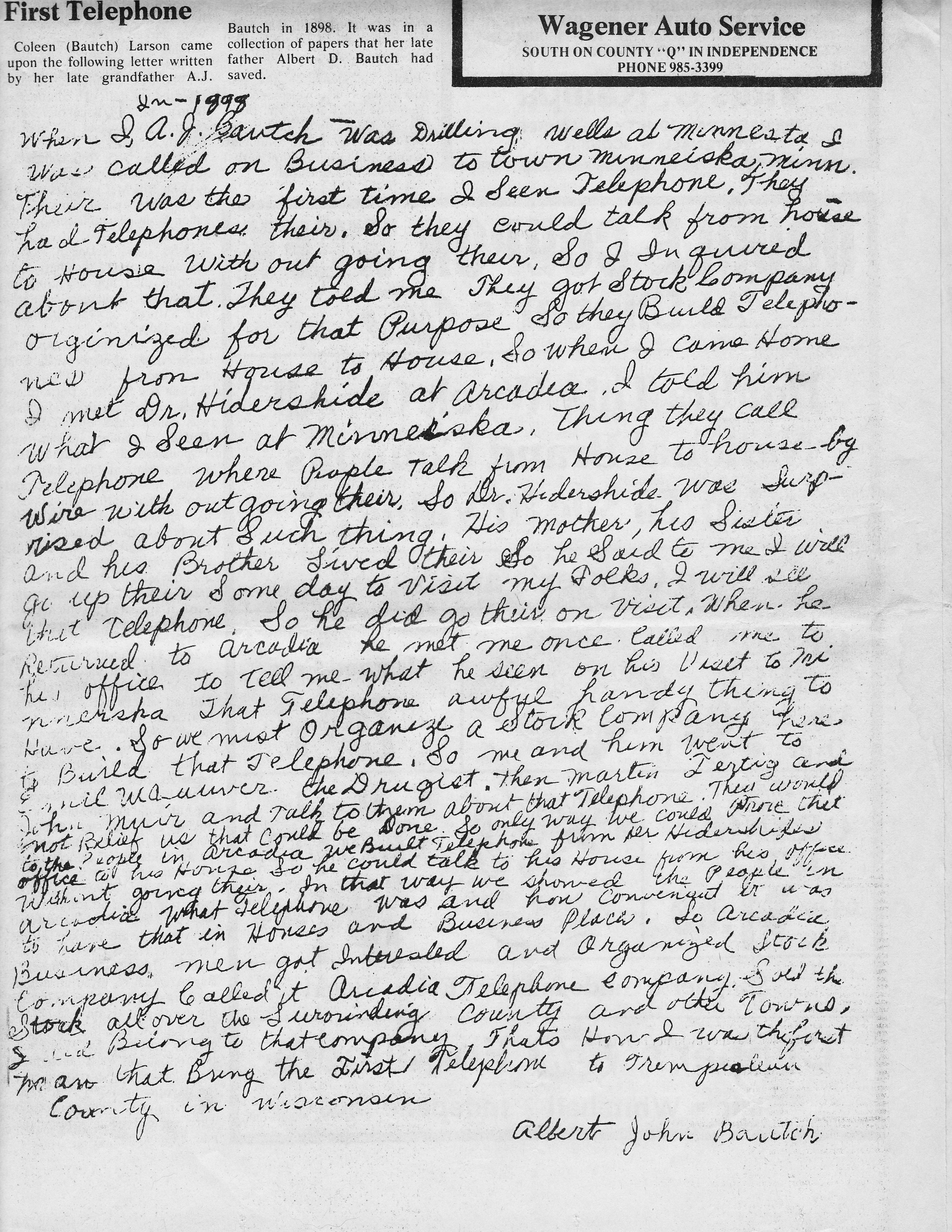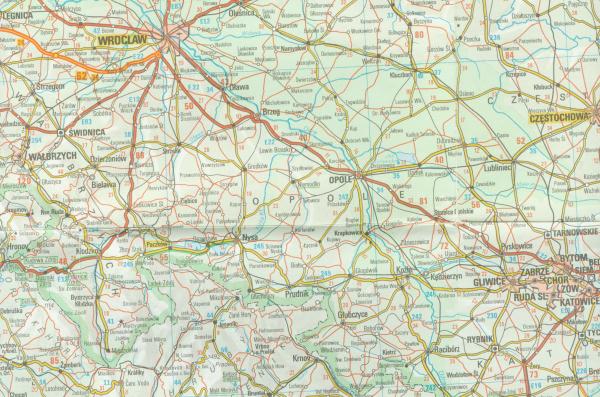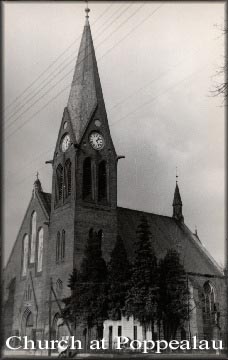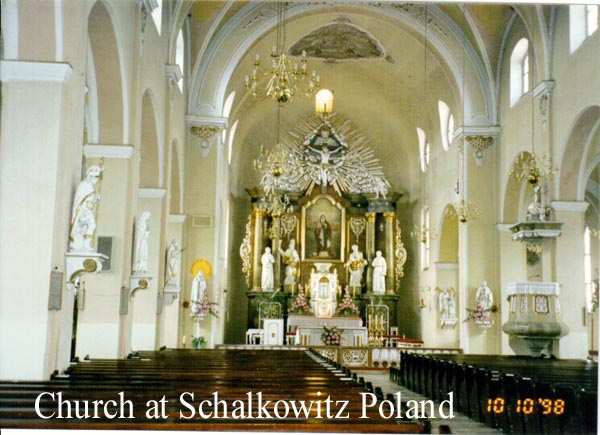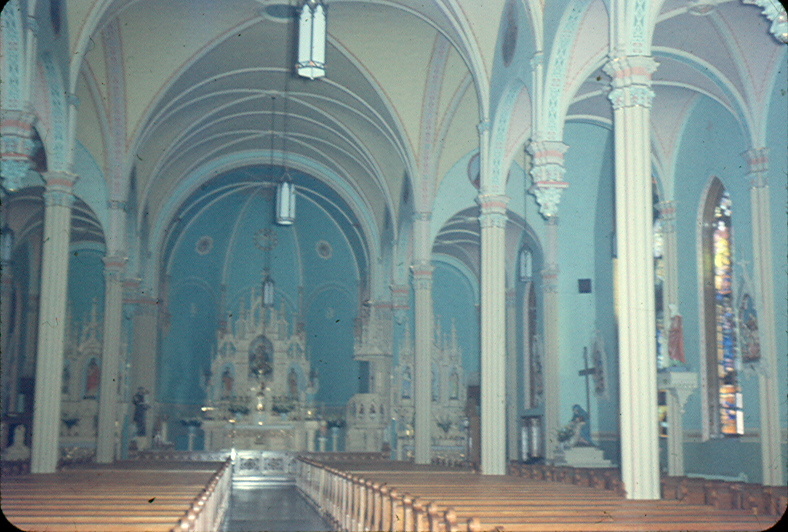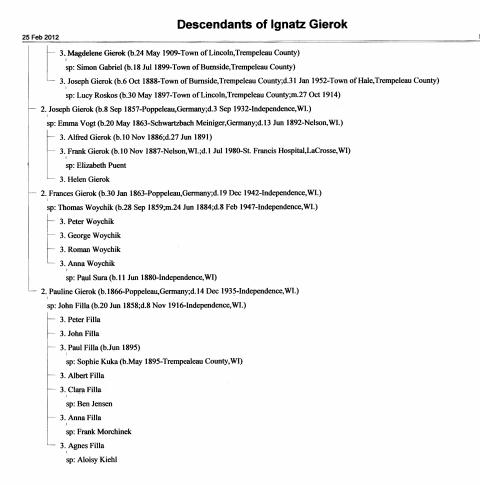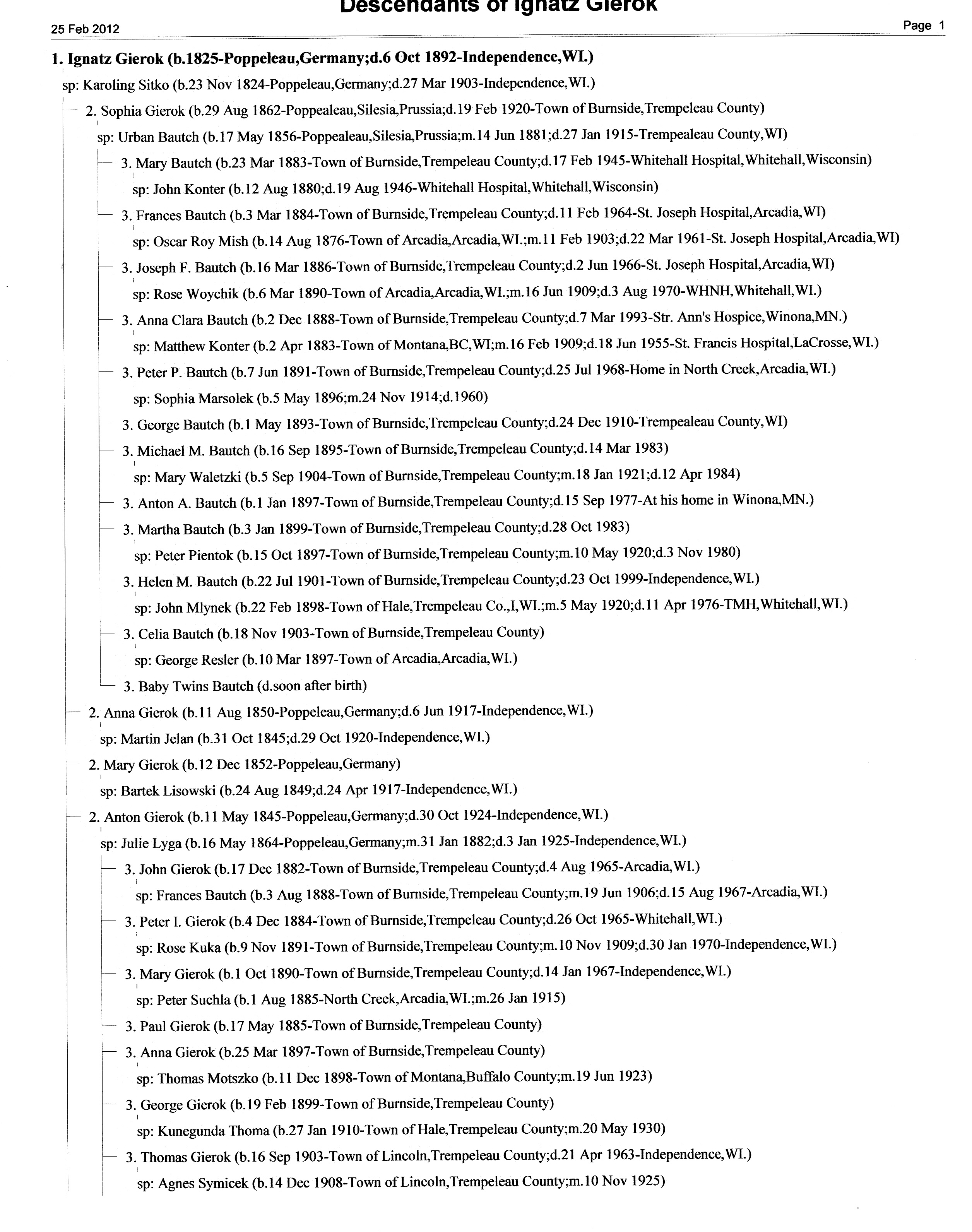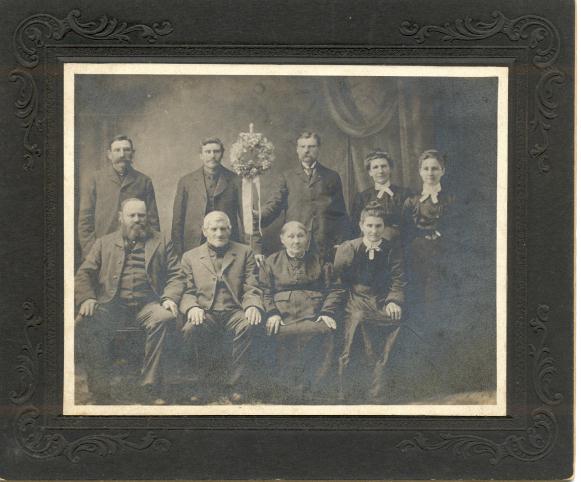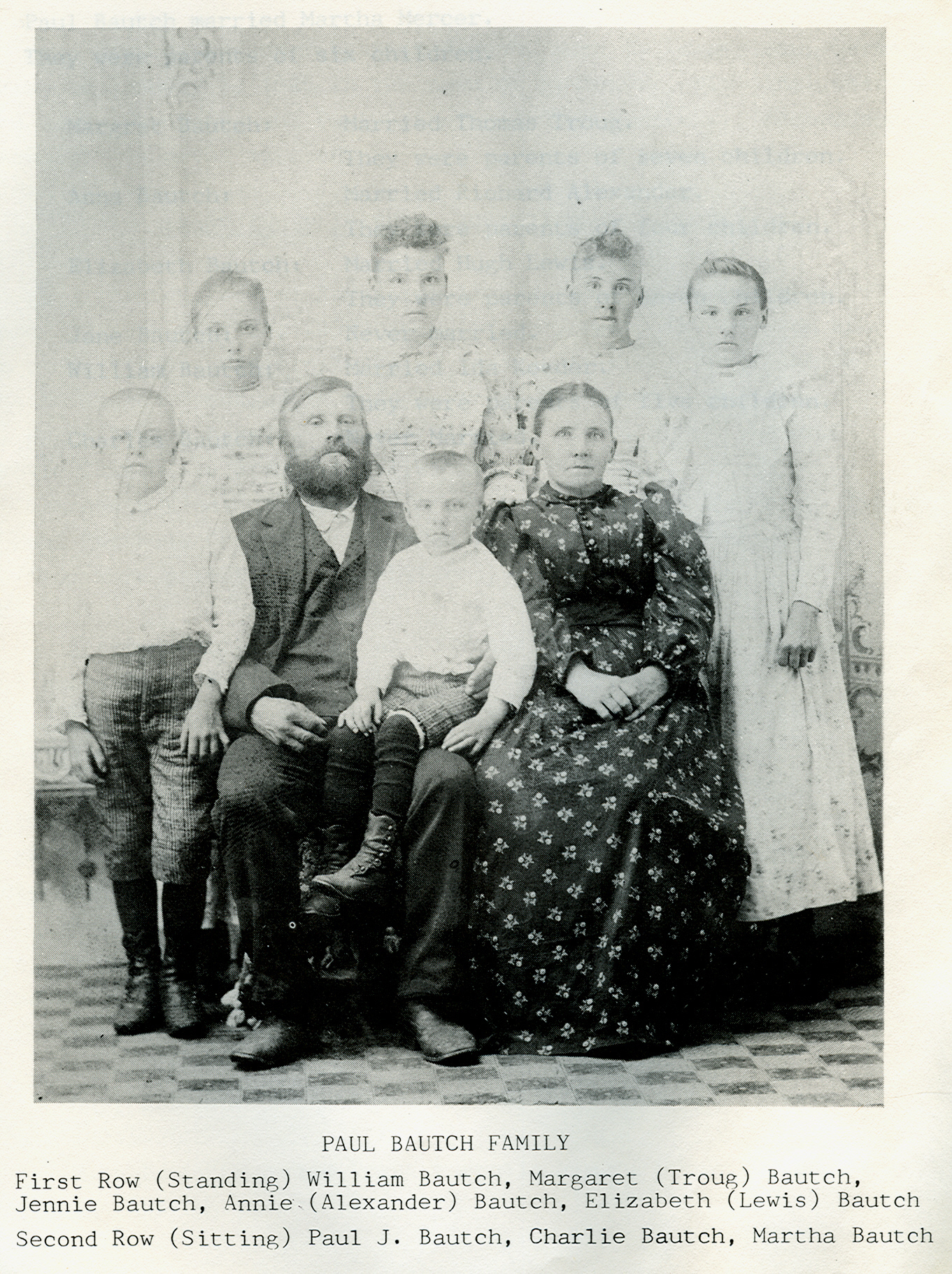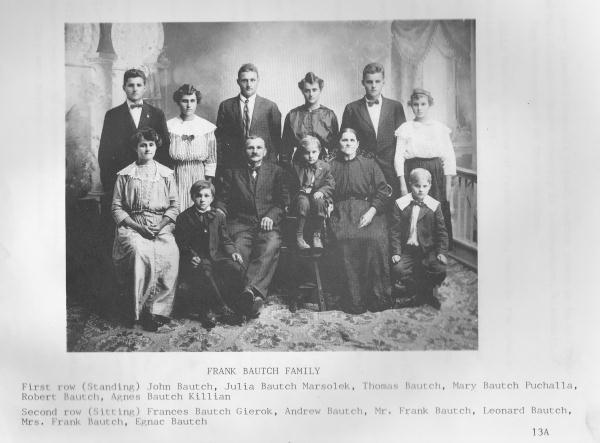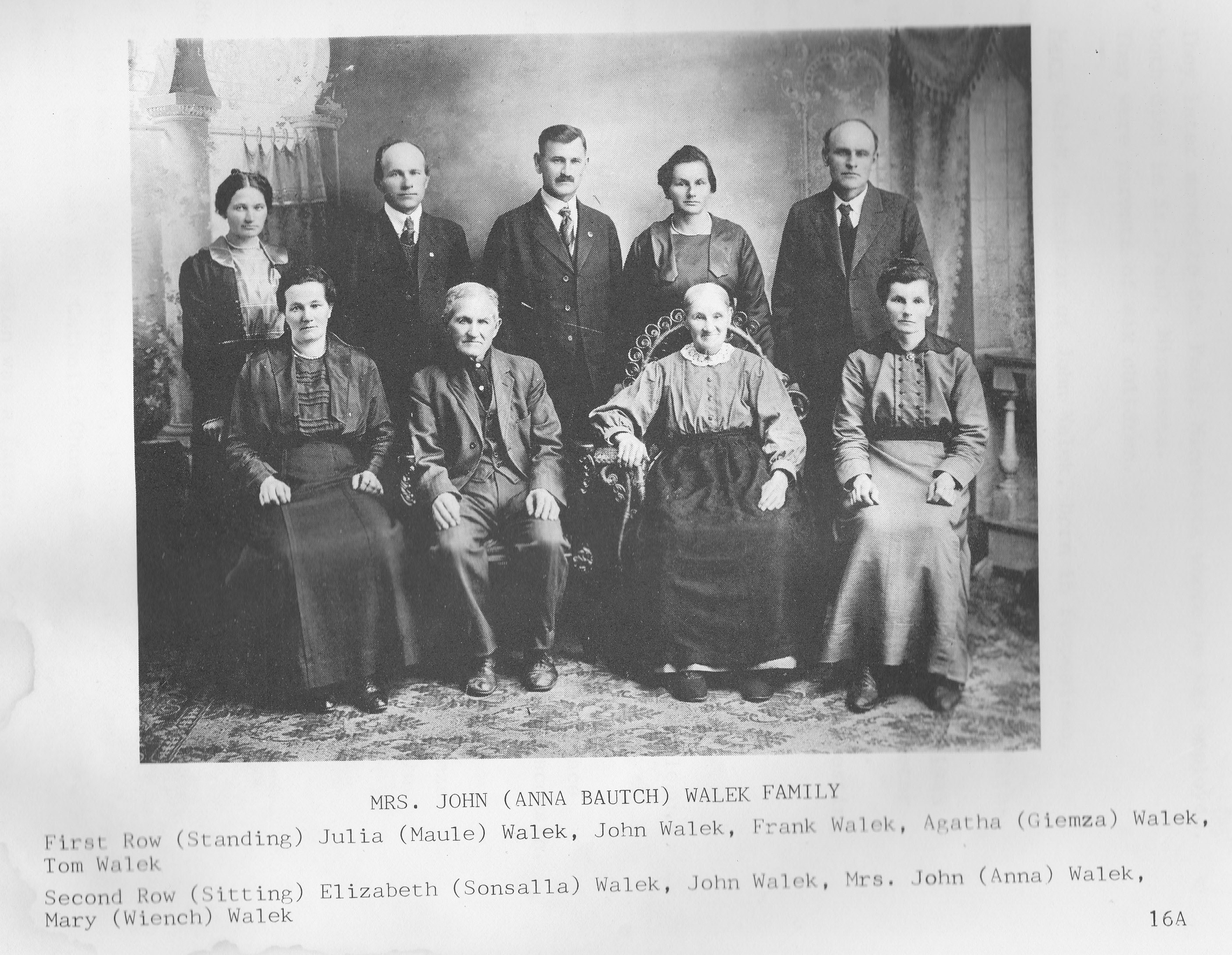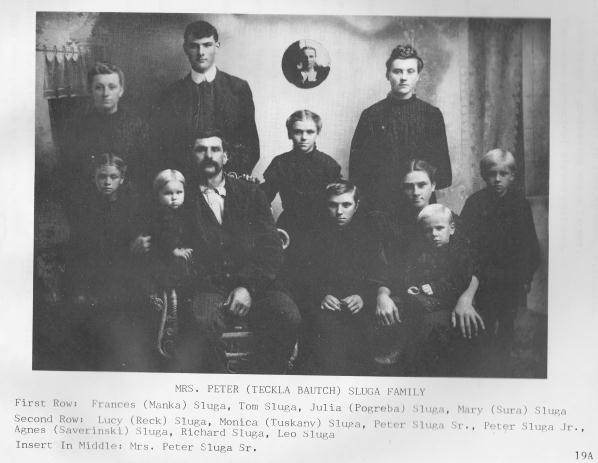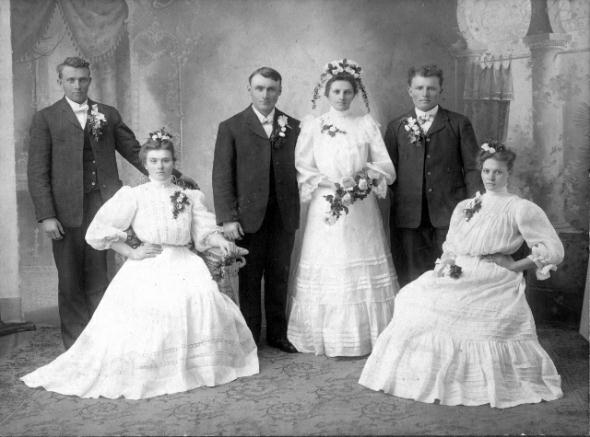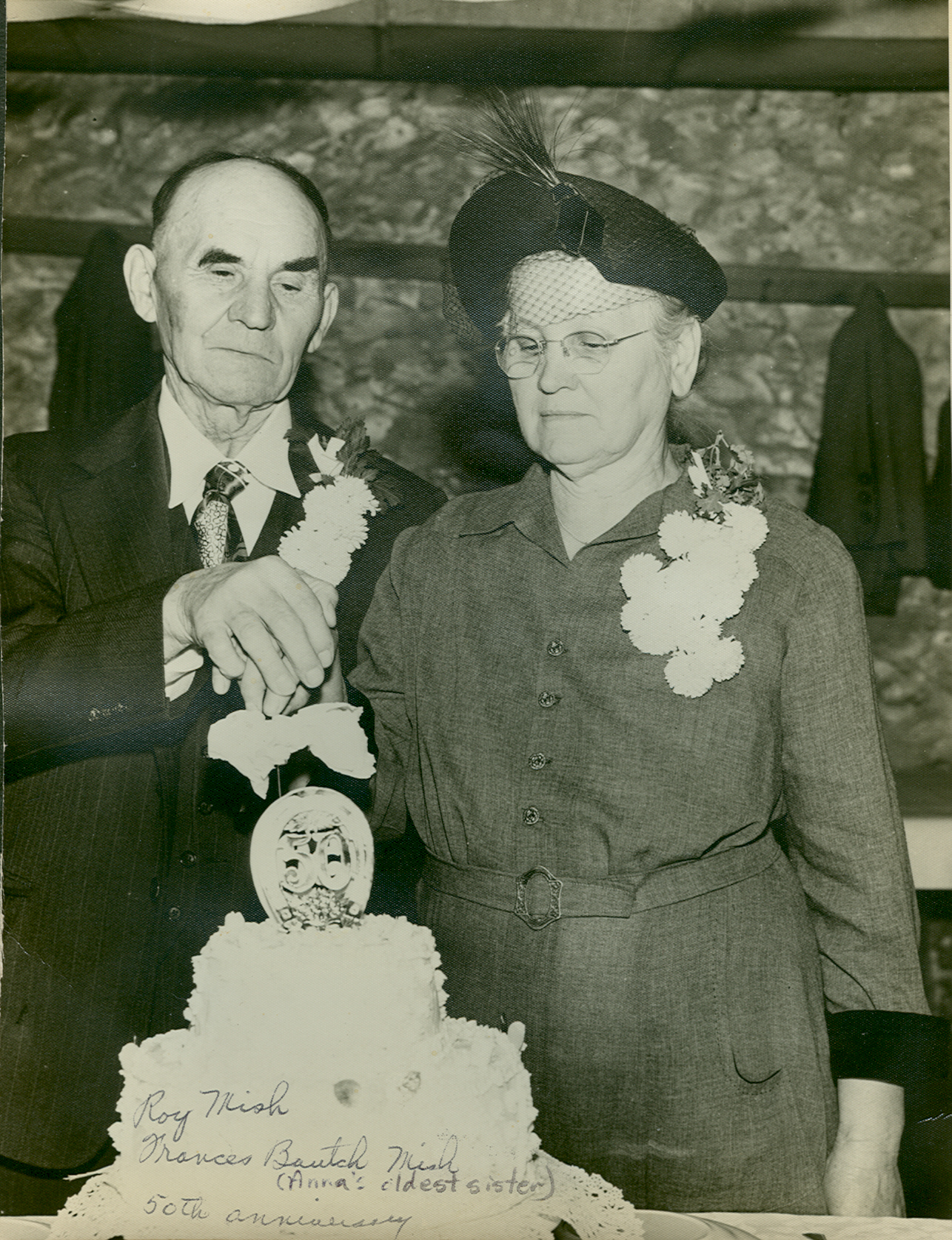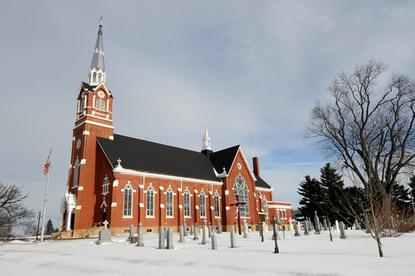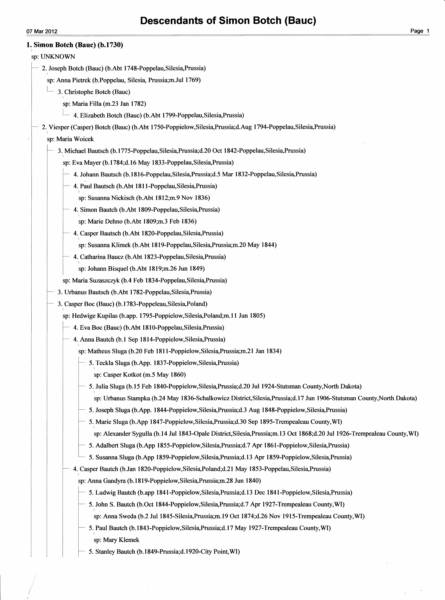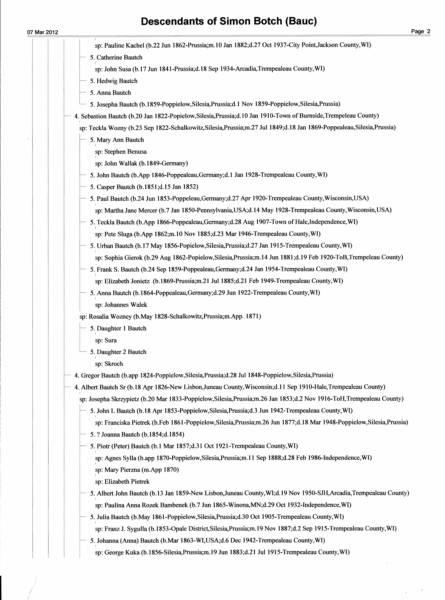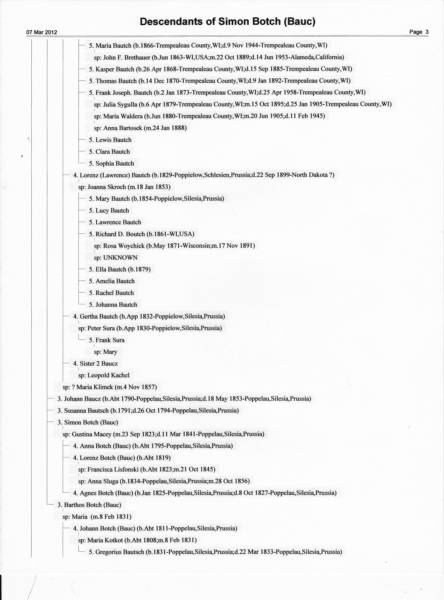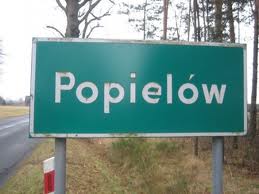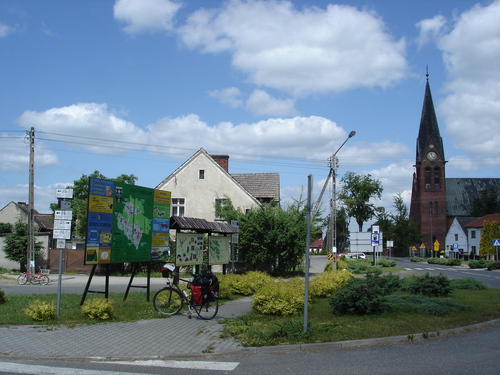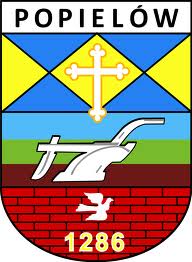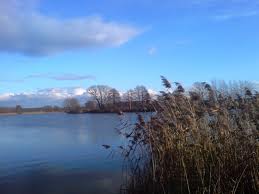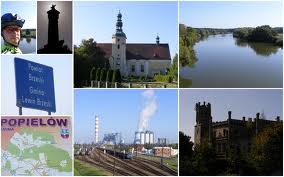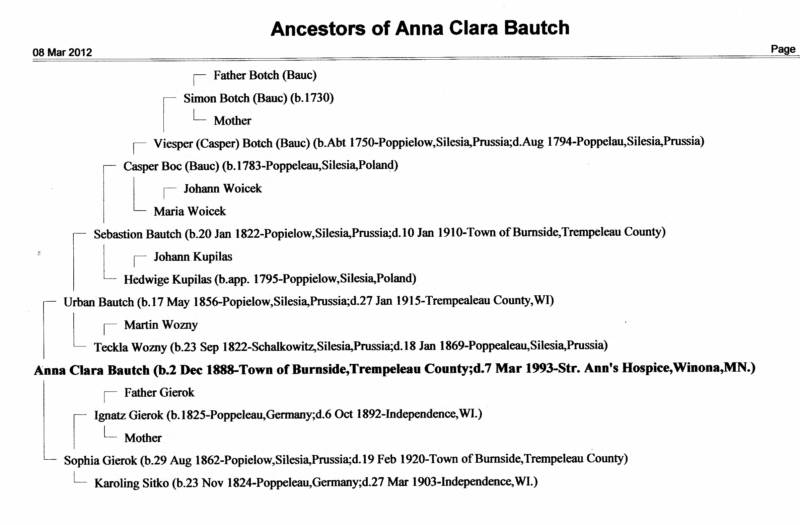This page is dedicated to our proud and feisty Polish speaking Prussian ancestors, Bautch and Gierok
The Bautches and Gieroks were Polish speaking Prussions from Poppielow, in the Silesia district of what is now southern Poland. They immigrated through the Port of Milwaukee between 1865 and 1875. Many members of this extended family came to the Independence, Wisconsin area, where they formed a "Polonoia," or Polish colony. They built the beautiful St. Peter and Paul Catholic Church there, with many items imported from their native country.
They left Poland due to economic and political reasons. As Polish speakers in a area often conquered by the Germans, they were subject to frequent war and persecution.
The wedding of Math Konter and Anna Clara Bautch, February 16, 1909
Matthew Konter and Anna Clara Bautch
Anna Clara Bautch was born on December 2, 1888, in the Town of Burnside, Trempealeau County, Wisconsin. She grew up in Travers Valley, on a farm in a little valley off Bugbee Road. (where a Gierok now lives.), daughter of Urban Bautch and Sophia Gierok. When she was little Uncle Anton, who was a reader in the old country, read the Bible to the children in Polish every night. Anna attended the country school through the 3rd grade.
Once when Anna was young (about 12) she was tending cattle, as there were no fences in those days. She crossed a wooden board over a creek, and hit her head when she fell in the water. She laid there for some time before others found her, and was unconscious for hours. She was afraid of water from then on.
When Anna was 13 she went to work at a tavern/ restaurant in Waumundee to pay off a bill owed by the family. After a year there she went to work for a taylor, where she learned her excellent sewing skills. She left there after a two years when the taylor began to get fresh. Then she went to work for a wealthy family as a maid where she learned to have fine mannersand embroidery. She worked for another wealthy family after that, which now owns Pier One imports.
Anna and Matt met through her sister Mary and Matt's brother John, who were married. Anna was Mary's bridesmaid at their wedding, and Math was John's groomsman. Math would come courting her in a horse and buggy. One story tells of a small scandal when they went for a buggy ride on a muddy road,and Anna, who fore some reason had to get out of the buggy, came home without her shoes.
Mathew Konter and Anna Bautch were married on February 16, 1909. After marriage they rented a farm outside of Arcadia, WI, on a hill above town off devil's curve. Their children were born there. They wanted to buy the farm but it didn't work out. They then purchased a farm on Gamaoke Road in the Fox Coulee of Tamarack Valley. They had a prosperous farm and raised cattle, pigs, sheep, poultry of all kinds, and crops, including cash crops such as strawberries. Anna also took goose down to Arcadia to sell, and kept some to make pillows and quilts of. Matt built her a fine new house on the farm, tearing down the old one, with 2 porches, beveled glass windows, and a lovely wood and glass buffet. They occasionally had dances in the house or in a barn, one old neighbor said, "Yeah, they always had a doings up on that hill." Matt Konter and Anna Bautch were parents to 5 children, 4 of whiom survived. A set of twins was also born premature and died at birth.
Anna was a local healer and lay midwife. She enjoyed picking berries, fishing, and going for walks in the woods. She sewed all of her family's clothes, sometimes, such as during the depression, of cotton sackcloth. She and Matt often visited siblings or had them to their house for a visit. They also loved to dance. She is characterized as an intelligent and strong woman, who essentially had her own garden, egg, and poultry production business on the farm separate from the main farm business, and so had her own money to use for clothes, home needs, etc.
They moved to Winona, MN, after retirement, as Matt took ill with cancer. Anna died on March 7, 1993, at the age of 104, nearly 105, of general old age and stroke complications.
To the left is the new farm house that Math built for his family in Fox Coulee, near Arcadia, Wisconsin .
(Right) The Konter Farm in Fox Coulee, near Arcadia, Wisconsin
(Left) The Mathew and Anna Konter family: (Top) Marcel, Anna, Leonard, Math, (bottom) Margaret and Alvina
Math and Anna Konter, 40th wedding anniversary, 1949.
The Mathew and Anna Konter family about 1950:
(above) Leonard and Marcel, (bottom) Alvina, Anna, Math, and Margaret
The Bautches
To the right are the 3 Bautch brothers: Albert, Sebastian, and Laurence. Sebastian is our direct ancestor. They were sons of Casper Bautch in Poppielow, Silesia, Prussia. The had 2 older siblings that stayed in Prussia: Casper Bautch Jr, and Anna Bautch (Gandera). 2 younger sisters and their husbands, Gertha Bautch Sura and Mrs Bautch Kachel, accompanied them to the US.
The labeling is actually incorrect: Albert Bautch is seated lower left.
Sebastian Bautch was born in Silesia, Prussia, son of Casper Bautch and Hedwig Kupilas. He married Teckla Wozney in Prussia and they had 7 children together. Teckla died young, and Sebastian then married her sister Rosalia to help him raise the children. It is uncertain at this time if he and Rosalia had children together. It is with Rosalia that he and his family came to America in 1874, following Sebastian's brothers Albert Sr. and Laurence who had immigrated 20 years earlier. (Another brother, Casper, and a sister, Anna, remained in Prussia.)
The Trempeleau County land patents database have him as being granted 160 homestead acres in that county on July 23, 1880.
Click here to add text.
Albert Bautch was born in Silesia, Prussia, where he was educated and reared and became adept at various lines of mechanics and woodworking. He was a pioneer miller and mill wright after coming to the US. He was son of Casper Bautch and Hedwig Kupilas, and brother to Sebastian and Laurence Bautch who also came to the US, and to Casper Bautch and Anna (Sluga) Bautch, who remained in Prussia.
Albert and his wife Josephine came to the US after a long and tedious 3 month sailing journey fraught with hardships. The entered through a Quebec port in 1854, having lost a large trunk on the voyage that contained the directions from Albert's cousin Joseph Bautch, who had preceeded them, as well as some of their baggage.
They made their way down the great lakes to Milwaukee, and then to Watertown, where they stayed for 1 year. They traveled to and arrived in New Lisbon, WI, Dec 24, 1854. There they homesteaded a farm. Albert also worked as a mechanic, a broad-ax hewer, and a logger on the Wisconsin River.
The Albert Bautch, Laurence Bautch, and Peter Sura families lived and homesteaded the farms near New Lisbon, WI, in Juneau County,for 7 years before traveling to Trempealeau County by oxen and arriving at North Creek in the Town of Arcadia in May of 1863 . Later in 1863, he helped to build the mill at New City, Trempealeau County, near what is now Independence. In 1869 the Albert Bautch Sr. family homesteaded a farm in section 26, Burnside Township in North Creek Valley near Arcadia, as one of the first settlers to that valley in 1867, and the first Polish settlers in the area. (Joseph Stanoskey and a man named Con Wiever also settled there that year with Louis Wojczik in 1868 and others after.) This property remained in the family at least until 1915: Albert Sr. had built a flour mill on the property which was also still there in 1915, owned by sons Albert J. and then John. (Note: an Albert Bautch was recorded in the Trempealeau County Land Patents Database as having been granted 80 acres of land on 12/10/1867, 40 acres on 06/10/1868, and 40 acres on 01/15/1875.) The Burnside Township community of Polish Prussian immigrants grew until it became the 3rd largest Polish colony in the United States by the early 1900's.
Albert was an organizer in the building of St. Michael's Parish, North Creek Valley, 5 miles NE of the village of Arcadia. Other organizers were Laurence Bautch, Peter Sura, Anton Sabotta, and Con Wiever. The first church was dedicated on Oct. 6, 1875, by Reverend Heiss, archbishop of Milwaukee. The lumber for the church was hauled from Arcadia, and in doing this Mr Sabotta lost his life when he was thrown from the wagon into the Kamla Mill Pond.
He is described in the 1915 A History of Trempealeau County as " a tall man who was a kind, loving husband, father and neighbor. He was absolutely true to the principles of American citizenship and was a hard worker. He was a bighearted man who was always ready to advise and assist others. He rapidly accumulated considerable property." He was a member of the Catholic Church and one of the organizrs of the North Creek Congregation. He and his wife died in the town of Burnside
Laurence Bautch was the youngest son of Casper Bauc and Hedwig Kupilas. His siblings were Casper and Anna Bautch, who remained in Prussia, and Albert and Sebastian Bautch, who also immigrated to the US.
Laurence Bautch and his family came to the US with his brother Albert Sr. and his family, and Peter Sura and family (who is listed in one record as his brother in law). They homesteaded and farmed for 7 years near New Lisbon, WI, in Juneau County before moving to Trempealeau County to homestead. He settled his family in the Town of Burnside, as did Peter Sura and his family. Later he took his family to the Fried, North Dakota area.
Laurence Bautch was noted by a local historian in a 040564 Winona Sunday newspaper to have been a blacksmith and to have been kept busy sharpening plows to break the new soil, which took 4 yoke of oxen to a plow to break the new land.
The Prussians are noted to be listed in the 1910 "A History of Trempealeau County"to be hard partiers, prone to drink, and as grudge holders for life.
Family legend says that the men in the family would periodically go to North Dakota to work on logging crews and bring home extra money. Some family members, particularily the descendents of Laurence Bautch, stayed there and settled in North Dakota. (Stutsman area)
Above- Urban Bautch and his sons
Sophia Bautch Gierok and her daughters
To the far left is Anna Cara Bautch, our ancestor
Urban Bautch immigrated from Poppeleau, Germany, along with his parents. He married Sophia Gierok and they homesteaded a farm in a narrow valley off Bugbee Road in Travers Valley near Independence, Wisconsin. Trempeleau County records have him as taking a land grant for 160 acres on October 10, 1882. There, they found a good water supply and dug a cave into the side of the hill where they lived for their first winter. They had been given 4 40 acre parcels, seeds, and $40.00 by the US government to start their farm.
Sophia had an outdoor oven in the side of the hill south of the house where she would bake large batches of bread with thick crusts that did not easily spoil. They built a large 2 room log cabin, with a kitchen and chairs on one side, and on the other side, which you had to step up to, there were beds. There were more beds in the loft. Two smaller cabins, to the north, were inhabited by Sophia's parents and an Uncle Anton, who was a reader, and who read the bible in Polish to the children every night.. They had a garden near the creek and planted apple trees on the hill above the house. The house, which had been added on to many times, burned down in 1995.
Urban and Sophia were said to be very involved with starting up the St. Peter and Paul Catholic Church in Independence, WI, a beautiful church decorated with stained glass from Poland and decorations in a very fancy old country style.
Urban and Sophia had 10 children, and a stillborn set of twins. Urban reportadly had an alcohol problem and this caused problems at times.
Above is a letter written by Albert John Bautch , who was the son of Albert Bautch Sr. and Josephine Skrypwietz Bautch. He also was a Trempealeau County Entrepeneur. The letter is regarding the development of the first telephone service in Trempealeau County
This scan is of the Opale district of Poland. Poppielow is above and to the left of Opale. This district is in the south/west to south/ central part of Poland, and just above the border with Czechloslovakia.
Below is a 3 generation list of the descendents of Casper Bauc (Bautch)
To the left and below is the beautiful St Peter and Paul Catholic Church in Independence, WI, built by our Polish Prussian ancestors
Below is a three generation tree of the descendents of Ignatz Gierok and Karoling Sitko
Above is Anna Clara, Martha, Helen, and Celia Bautch, daughters of Urban Bautch and Sophia Gierok
The Albert Bautch Sr and Josephine Syrzypietz family. Albert was brother to Sebastian and son of Casper Bautch (Bauc) Sr. He was born in 1826 in Poppielow, Silesia, Prussia. He and his wife were among the first of the Trempealeau County Polonia immigrants in 1854. Albert Sr, died in 1910 in Trempealeau County.
To the left is the Paul Bautch and Martha Mercer family. Paul was born in Poppielow in 1853, the son of Sebastian Bautch and Teckla Wozney. He accompanied his family to America as a child. He died in 1920 when a tree fell on him.
Above is the Frank Bautch and Elizabeth Jonietz family. Frank was the son of Sebastian Bautch and Teckla Wozney. He was born in 1859. He came to America with his family as a child, and died In Trempealeau County in 1945..
Above is the John Walek and Anna Bautch family. Anna was the daughter of Sebastian Bautch and Teckla Wozney, and was born in Poppielow, Prussia in 1864. She was brought to America with her parents as a child. She died in Trempealeau County in 1922.
Above is the Peter Sluga and Teckla Bautch family. Teckla was the daughter of Sebastian Bautch and Teckla Wozney. She was born in Poppielow, Prussia and was brought to America with her family as a child. She died in Trempealeau County in 1907. She had passed before this photo was taken and is in the little photo inset in the portrait.
Below are other children of Sebastian Bautch and Teckla Wozney and their families
IF YOU ARE A RELATIVE and have family information or scanned photos to share with our family, please mail me- see page 1 for contact.
Other Children of Urban Bautch and Sophia Gierok
The John Konter and Mary Bautch wedding. The children from this marriage were double cousins to our side of the family. Mathew and Anna are attendents on the right.
This is George Bautch, son of Urban Bautch and Sophia Gierok. George died at the age of 19 of diptheria on Christmas eve. His body was carried outdoors and left in the snow until burial, as the ground was too frozen to bury him.
To the right is Anton Bautch, who many of us knew as Uncle Tony. Anton Bautch was a WWI Veteran in 1918, and served in the European theatre in that war. He sometimes told stories of how terrible the war was and how they did not have enough food to eat. He was described as a rough and tumble man. He was a retired employee of Yanke Ice and Fuel Company of Winona, MN. He was a devout Catholic all of his life. He never married.
I remember my mother taking Uncle Tony and his sister Anna Clara to church and to get groceries, and sometimes to go fishing with us. He lived in a small house on fuel company property in his later years.
Above is the Mike Bautch and Mary Waletzki wedding, with a portrait of Mike Bautch to the left. Mike Bautch took care of the Urban Bautch family farm during WWI.
Mike Bautch and Mary Waletzki were farmers.
They were parents to 11 children.
At right, Standing is Peter Bautch, son of Urban Bautch and Sophia Gierok. The seated boy is one of his friends. Peter was born in 1891 in Trempealeau County, and married Sophia Marsolek. He died in 1968 in Arcadia, WI. Peter P. Bautch was a carpenter.
Peter Bautch and Sophia Marsolek were parents to 8 children.
Above is Celia Bautch, daughter to Urban Bautch and Sophia Gierok. Celia was born in 1903 in Trempealeau County and married George Resler.
Celia Bautch was a rebel who did her own thing. She was the first girl in Arcadia to get a short bob haircut, causing a lot of talk. But she didn't care! She also was the first girl or woman in Arcadia to wear slacks. Celia Bautch and George Resler were wed when she was 16. He was quite a bit older then her and thought the world of her, and was a very good man.
Alvina Konter told the following stories about Celia and her family:
"When I was 9 years oldI had appendicitis and had surgery in Winona. Celia came to visit me there and brought me a bouquet of sweetpeas. I'll always remember that.
They had 4 boys. When I went to visit them in Independence, I don't think I saw one chair in the house that wasn't broken. Even the mirror was broken- everything seemed to be. The boys had chunks of their hair pulled out; they had a paying job with a newspaper route, and other boys picked on them because they were jealous so their hair got pulled out in fights. I saw the way it looked around that house and I thought, doesn't she care? But now I know.... When those boys grew a little older thay bought her all new furniture for the house and replaced all the broken items. And they were the best boys!
George was a bartender in an Independence tavern, where they held dances. I don't know if they owned that tavern or not. He was a kind man, and very good looking. When he got so his legs gave out on him, they moved to Milwaukee, as they had 2 sons there. One was a policeman, one was a private detective, and one went to California. I think one had a horse ranch in Arizona, too. The youngest boy used to stay with Grandma and Grandpa out on the farm a lot. He came to Ann's funeral, when he saw the notice when he happened to be in the area."
George Resler and Celia Bautch were parents to 4 boys.
Above and to the left is Helen Bautch. Helen Bautch was born in 1901 in Trempealeau County, Wisconsin, USA. She married John Mlynek in 1921 and died on October 1999 in Independence, Wisconsin. John Mlynek and Helen Bautch were parents to 4 children. John had poor health all of his life with headaches, back problems, and other problems, so Helen often worked outside the home and was the breadwinner of the family, as a housekeeper, seamstress, painter, etc. They moved about some but always stayed in the Independence area.
Helen had a nice personality and was very friendly. She was at Joseph and Margaret Theisen's 50th wedding anniversary party. She lived to be 98 years old.
Above is Martha Bautch, daughter of Urban Bautch anf Sophia Gierok. Martha was born in 1899 in Trempealeau County, Wisconsin, USA. She married Peter Pientok in 1920 and died in 1983.
The following story was told by Alvina Konter about her Aunt Martha:
Martha Bautch, as a young girl, was the only one of the children who had not successfully mastered the violin as taught by her grandfather Ignatz. Her brothers and sisters teased her about this, and one day she got mad at them. She picked up the violin, and said she was going into the woods, and either she would learn to play it or she would smash it against a tree. She did, in fact, learn to play her song on the violin that day and the instrument was not destroyed.
Martha Bautch Pientok was a very good housekeeper and was very strict with her household. She could sew and cook well. She and her husband lived in a big brick farm house near Waumundee, WI. She had a big garden and did lots of canning. The Pientoks visited with the Math and Anna Konter family quite often. Peter Pientok and Martha Bautch were parents to 3 children.
Above are Celia, Tony, and Helen Bauch
Baby Bautch Twins. Urban and Sophia had a set of twin babies that died soon after birth. I have not found a record of their names.
To the right are Frances Bautch and Roy Mish.upon their 50th wedding anniversary. Frances was born in 1884 in Trempealeau County, Wisconsin, USA. She married Roy Mish in 1903. She died in Arcadia, Wisconsin in 1964.
Oscar Roy Mish and Frances Bautch were parents to 4 children. Francis is described as being very fussy about her home, in which everything had to be just so. She was neat and careful. She had a lot of doilies and did a lot of crocheting. She had a formal parlor that you (especially children) didn't go into much.
 | ||||||
History of S. S. Peter & Paul Catholic Church of Independence ________________________________________From the book "100 Years In the Lord's Service, 1875 - 1975"(A History of the S. S. Peter & Paul Church)Donated by Pat (Wiersgalla) Fischer In the late 1850s a small group of Polish immigrants settled in Trempealeau County, Wisconsin. They brought with them the cultural heritage of their native Poland. An important part of that heritage was their devotion to the Roman Catholic Church. The culmination of their religious zeal was the formation of Saints Peter and Paul Parish in Independence, Wisconsin, in 1875. In the ensuing century these Polish people have preserved, to some extent, the traditions of their ancestors. As a result of temperamental and historical conditions, it has been claimed that the devotion of the Polish people in Roman Catholicism surpasses that of any other nationality. America had been know to many Poles from the time of its discovery. Early immigrants were numerically small. Miecislaus Haiman divides Polish immigration to the United States into three periods: Colonial Immigration 1608 - 1776 Political Immigration 1776 - 1865 Economic Immigration 1865 - 1939The latter group is of interest here. It is from this group that the vast numbers of immigrants came to America. It was primarily economic reasons which brought the first settlers to Independence, Wisconsin, and led to the formation of Saints Peter and Paul Catholic Parish. It should be noted here that the first settlers of Polish descent to settle in Independence (then the Town of Burnside) came from Silesia. Silesia was an old Polish province which for six centuries vacillated between Bohemia, Germany and Austria. Although the area from which the immigrants came was a part of Germany and had a mizture of German customs and language, it remained primarily a Polish ethnic and religious grouping and the people considered themselves as Polish. Perhaps this was true because Popielow, the small rural community from which they came, was in an area that was no more than a few miles from Poland's border at anytime. Although a part of Germany from a political standpoing, they remained a part of Poland culturally. The State of Wisconsin along with other Midwestern States, was interested in populating its vast territories. Wisconsin offered the availability of farmlands which attracted the early peasant immigrants. The large city of Milwaukee had jobs in industry and presented an opportunity for the unskilled workers. Small agricultural communities attracted the early Polish settlers. The earliest Polish rural settlements in Wisconsin was Polonia in 1855. Other Polish settlements followed at Stevens Point, Marinette, Berlin, Menasha, Manitowoc, Beaver Dam, La Crosse, Pulaski, Bevant, Galloway, Green Bay, Hatley, Superior, Thorp and Independence. By 1865, the first Polish Catholic Church in Wisconsin was organized in Milwaukee. Among the Polish immigrants attracted to the State of Wisconsin in the 1850s was the Albert Bautch family. This included Albert Bautch, born in Popielow; his wife, Josephine Bautch, whom he married in 1853 in their homeland; their small son, John L. Bautch, born in 1853 in Popielow; a brother to Albert, Lawrence Bautch; and two brothers-in-law, Peter Sura and Leopold Kachel. They came by a long boat journey and landed in Quebec, Canada. From there they came to Wisconsin, first living in Watertown for about a year, then in New Lisbon, Juneau County, where they farmed for six years. In May of 1863, they moved by oxen and covered wagon to North Creek, Town of Arcadia, Trempealeau County. It was in 1869 or 1870 that the family moved to New City, Town of Burnside, just outside the present site of Independence. It was Lawrence Bautch and Peter Sura who were responsible for influencing many of their fellow countrymen to settle in the same area. Among the early settlers in the area coming from Popielow were Leopold and Peter Filla, Robert Gamroth, Carl Halama, William Jonietz, Phillip Klimek, Mary Skroch Kulig, Albert Lisowski, Mike Lyga, Thomas Pampuch, Andrew Skroch, Julius Smick, John Susa and Alexander Sygulla. It is interesting to note that each of these family names appear in the 1975 membership of Saints Peter and Paul Parish.
They immediately organized themselves into a parish. Although 1875 is the generally accepted date of origin of Saints Peter and Paul Parish, some historians would argue for the earlier date when the people began to gather at irregular intervals for services in private homes. The smallness of their numbers and the economic hardships involved required that meetings be held in private homes until a church could be built. When they had increased to about sixty families, a ten acre site for a church was acquired from the Markham family for the sale price of fifteen dollars. The first white frame church was completed and dedicated by Bishop Michael Heiss, Diocese of La Crosse, on October 7, 1875. On the previous day the Bishop had dedicated the church at North Creek. The Bishop was pleased as he wrote to his friend von Scherr in December of 1875: "This year especially I have experienced great consolation through the zeal of the Poles in this diocese. They built three beautiful churches for themselves, and also furnished them very well. The largest one cost $13,000, yet I will not have to fear any difficulty about meeting the payments. The Poles...are always a noble people, animated by a spirit of sacrifice for their Catholic faith."Father Hieronymus Klimecki served the new parish along with his duties at Saint Michael's Parish at North Creek where he resided. From these early days as a mission parish of some sixty families, Saints Peter and Paul has grown to be one of the largest congregations in the diocese. There are over nine hundred adult envelope holders or financial supporters of the parish.
Scenes from the old country: Popielow,Poland, formerly Prussia. Below: Coat of arms.
Below: Popielow postcard
